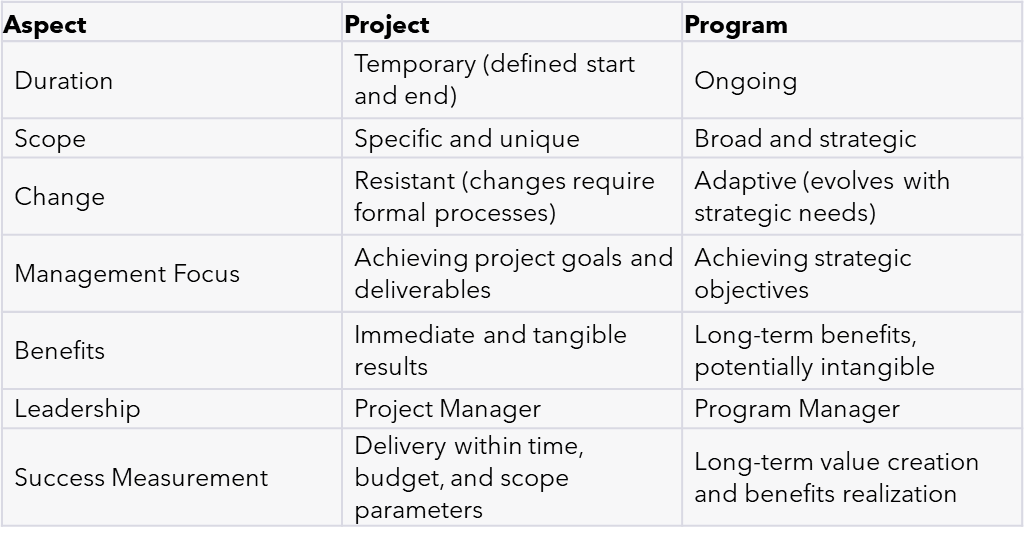In the landscape of business management, the terms “project” and “program” are often used interchangeably, leading to confusion. However, in the corporate world, these terms have distinct meanings, applications, and implications for business success. This article aims to demystify these concepts, providing clarity through definitions, use cases, and a comparison that outlines their differences.
Defining Project and Program
Project: A project is a temporary endeavor undertaken to create a unique product, service, or result. It has a defined beginning and end, usually constrained by time, resources, or deliverables. Projects are specific in scope and objectives and are designed to achieve particular goals within specified constraints.
Program: A program is a group of related projects managed in a coordinated manner to obtain benefits not available from managing them individually. Programs may include elements of ongoing work outside of the discrete projects within them. Unlike projects, programs are ongoing and are not constrained to a short timeframe.
Use Cases
Project Use Case: Imagine a company launching a new software tool to automate their inventory management. This launch is a project. It has a clear start date (when the project team is assembled), specific milestones (like the completion of the software development, testing phases, and the final rollout), and an end date (when the tool is fully implemented and the project objectives are met).
Program Use Case: Consider a technology company that aims to innovate continually within the digital payment space. It establishes a program consisting of multiple projects: one for developing a mobile payment app, another for creating a new cryptocurrency wallet, and yet another for enhancing cybersecurity measures. Each project under this program has its unique goals and timelines, but all align with the broader objective of dominating the digital payment market.
Comparison Table

Discussion
In the corporate setting, projects and programs serve different purposes and require different management approaches.
- Projects are the engines of change. They are designed to address a specific need in a finite period, and their success is measured by their ability to deliver the expected outcomes within the agreed-upon constraints.
- Programs are about strategic alignment and organizational growth. They enable businesses to manage interdependencies between projects and to optimize resources for a set of strategic objectives.
Both projects and programs are essential to a company’s strategy execution. Project managers are tasked with overseeing the project’s life cycle, focusing on timelines, budgets, and specific objectives. Program managers, on the other hand, oversee the strategic aspects, ensuring that all projects within the program align with the business’s long-term goals.
Conclusion
Understanding the distinction between projects and programs is crucial for effective business management. While projects are focused on achieving specific goals in a limited timeframe, programs are aimed at achieving broader strategic objectives through coordinated management of multiple projects. Recognizing and respecting these differences allows organizations to allocate resources effectively, manage efforts strategically, and achieve both immediate and long-term business goals.


